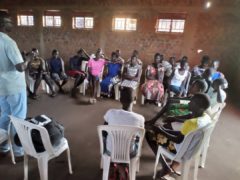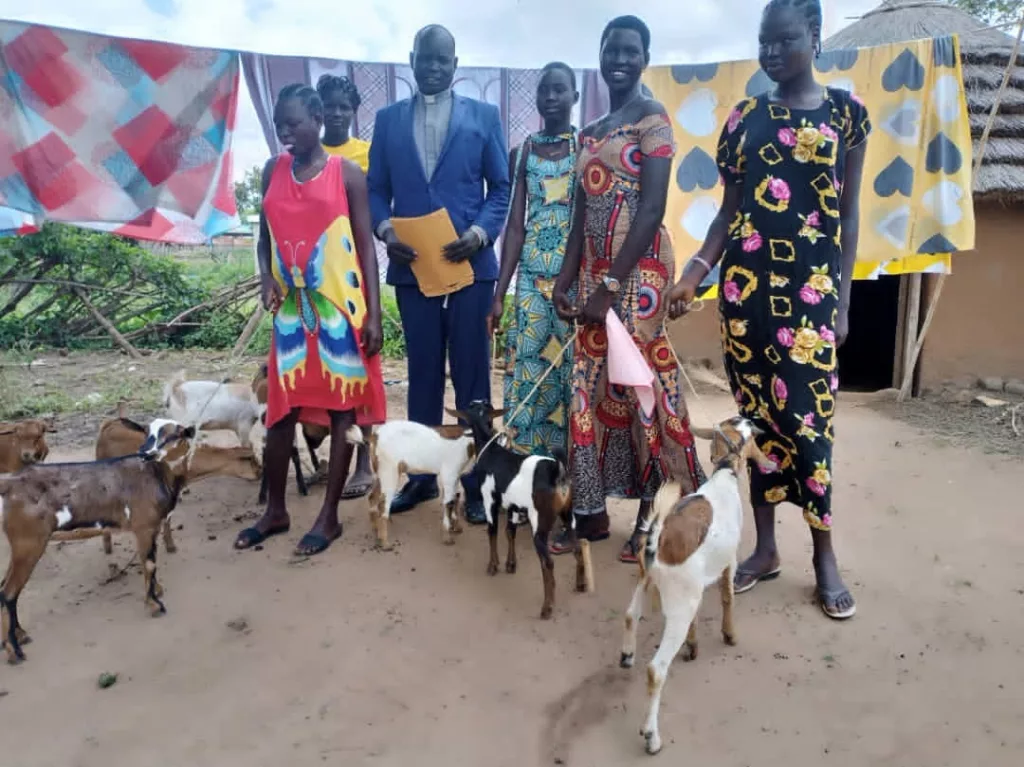St. Joseph-Benton Harbor Rotarians are joining hands across continents to empower women in Uganda. It’s a complicated story, but one that Rotarians are very proud of:
The Rotary Club of St. Joseph-Benton Harbor, in collaboration with the Grosse Pointe (Michigan) Rotary and the South Sudan Leadership and Community Development (SSLCD) organization, with matching grant funding from a Rotary Foundation District 6360 Grant, is providing programming in Uganda to empower South Sudanese refugee women.
On why the Rotary Club of St. Joseph-Benton Harbor was inspired to take on this work, International Committee chair, Lynn Kellogg, explaine “This project reaches remote leaders and builds an infrastructure of learning to transform hopelessness into courage and confidence. The committee also felt strongly about supporting initiatives that provide a self-sustaining impact. This work improves lives by improving skill sets to create opportunities for business development.”
About South Sudan Leadership and Community Development
SSLCD is a 501(c)(3) charity organization based in Grand Rapids, Michigan, founded in 2004 to promote the health and well-being of South Sudanese villagers through grassroots leadership and community development in Mungula and Olua refugee camps in Northern Uganda. They focus on empowering women by assisting them through the birth process with birth assistants and supplies as well as supplemental food provision.
Refugee Need
It seems there’s not a week that goes by without a major refugee situation somewhere in the world with people having to flee their homes. More and more often, these are not short-term phenomena. With so many prolonged situations, the World Food Program is being overrun with demand. The SSLCD works on projects to respond to this situation in Uganda and help refugees to have a way to provide for themselves. With demand so great, they are not going to get what they need from outside organizations and they need to figure out a more sustainable way to live as refugees for an extended period of time…perhaps generations.
The South Sudan refugees are among the most unfortunate people on the planet. Sudan has been in a constant state of war, pretty much since their independence from Britain in 1956 and South Sudan has fared no better since its independence in 2011. Most Sudanese people have been refugees multiple times within their lifetime and have faced unprecedented challenges.

About the Project
The Rotary Club of St. Joseph-Benton Harbor has been active in supporting two settlements, Olua and Mugala, in Uganda and most recently shared an update about the purchase of a diesel operated grain mill for each settlement to be owned and operated by a collective of Ugandans and refugees working together. Having the grain mills will allow them to grind their own grain as well as provide the service to neighboring people as a source of income.
Further work this year has identified 84 young women who were “disaffiliated” from their families and communities. All were traumatized and had either been victims of violence or had witnessed violence against their family or friends prior to fleeing to safety. None of these women had formal education and many were young and married and had been removed from the household by their husband, sometimes with young children. All of these women were feeling hopeless, insignificant, powerless, invisible, and without futures. Some were even suicidal.
The women leaders from the settlement interviewed the young women and families and were tasked with selecting 20 women from each settlement to participate in this program. Those selected range in age from 14 to 22 years old.
Grosse Pointe Rotary led the first stage of the program to provide training to the women on a number of topics relevant to their lives and to foster connection and group identity. The Rotary Club of St. Joseph-Benton Harbor and funding from a Rotary Foundation District 6360 matching grant then launched the next phase which focused on the development of business management skills. This work was facilitated by a local trainer who works for the Ugandan government to set up cooperatives.
This training curriculum included:
personal budgeting
cooperative budgeting
product assessment
assessment of cost and quality of supply materials
customer relations
conflict resolution
profitability and profit sharing
self-sustaining business modeling
skills assessment
logistics
accountability
Throughout the training process, the young women gained new skills but most importantly, found hope. The young women were empowered to make decisions about the types of cooperatives to establish and how they should be structured. Cooperatives were formed around beading and embroidery, hair care and styling, and animal husbandry. The cooperatives are structured so that each young woman learns skills and experience in all areas. The young women meet to set up rotating schedules for work and childcare.
Stories of Transformation
Nyamut, age 18, escaped the violence in her country, having witnessed some of the many atrocities of war. To help her family survive, she was married off to a much older husband. He did not support her education and she was forced to drop out of school. When she became pregnant, he put her out of the household. Her parental household could not afford her needs and the additional needs of the baby. She existed only with the meager support of her settlement. Sometimes she would stay with a widow and help her chop wood and fetch water. Once her baby was born, she became even more vulnerable. She saw absolutely no future for herself. She could not go back to school because she could not afford it and now she would need childcare. She thought about suicide as the only way out.
She is excited about now being able to bring something to the table of her family, as she says. She loves the exchange of innovative ideas with the other young women and sees a brighter future for herself.
Apojak is now 20, and became an orphan in the fighting. She has had to find ways to survive on her own, for the most part, in the settlement. She has had no formal education whatsoever but she had a hunger to develop some life skills and was proactive in her approach to the women leaders to ask that she be considered for the program.
Through the training she has developed a love for learning and says she wants to enroll in school and hopes she will still be learning when her hair turns gray. For the first time in her life she feels like she belongs.
People in the settlements have known these young women over the years and are amazed at their transformation. They are excited for them and for their futures. SSLCD staff say the young women are using some of their new found enthusiasm to challenge them (in a good way) to find funds to engage the 40 plus other young women so that their lives can change as well.
Story and photos submitted by SJBH Rotary’s Emily Kirchner






